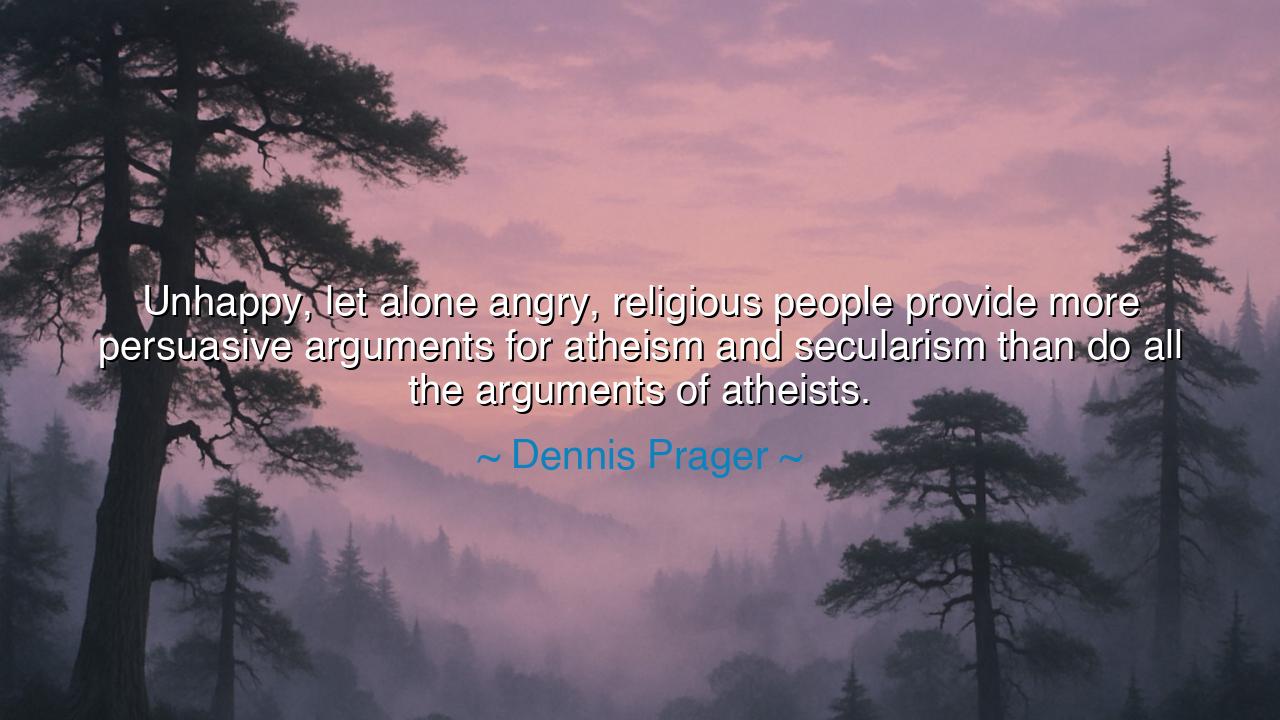
Unhappy, let alone angry, religious people provide more
Unhappy, let alone angry, religious people provide more persuasive arguments for atheism and secularism than do all the arguments of atheists.






In the piercing and timeless words of Dennis Prager, the moral philosopher and teacher of modern times, we hear a truth that resonates through every age: “Unhappy, let alone angry, religious people provide more persuasive arguments for atheism and secularism than do all the arguments of atheists.” These words are not the accusation of an unbeliever, but the lament of a man who loves faith and mourns its misrepresentation. Prager speaks as one who understands that belief in God is not proven by logic alone, but by the radiance of the believer’s life. For what use is creed without joy? What power has a doctrine proclaimed in anger? When the faithful lose compassion and peace, they turn the very light of heaven into a shadow, and their bitterness becomes the strongest sermon for disbelief.
Dennis Prager, a scholar of theology, ethics, and reason, is a voice who seeks harmony between faith and moral clarity. His words arise from decades of observation—of pulpits filled with wrath, of congregations burdened by guilt instead of lifted by grace. He reminds us that faith, in its truest form, is not a weapon but a witness. When religion breeds misery or rage, it betrays its divine purpose, for God is not glorified through fear, but through transformation. Thus, Prager’s statement is both rebuke and reminder: the credibility of faith is measured not by argument, but by character.
When he speaks of “unhappy religious people,” he points to those who wear belief as a chain rather than a crown—those whose religion becomes a vessel for judgment, resentment, and pride. To them, the sacred is no longer a source of renewal, but of burden. They may speak of God, but their faces reveal no trace of His joy; they may defend heaven, but they do so with words forged in bitterness. Such souls, though well-intentioned, drive others from the faith they claim to protect. For the world does not look upon theology—it looks upon human example. The unbeliever is not convinced by sermons, but by the sight of a life transformed.
Consider the story of the early Christians in Rome, who lived under persecution and threat of death. The philosophers of their time—brilliant minds like Seneca and Epictetus—argued that virtue was found in self-sufficiency and reason. Yet the Christians, though poor and oppressed, sang hymns in the catacombs, forgave their executioners, and cared for the sick when others fled the plague. Their joy in suffering, their peace amid torment, became the greatest argument for their God. The Roman Empire, with all its power, could not silence the quiet testimony of their happiness. Their radiance converted more souls than any disputation ever could.
But when religion becomes a source of anger, it corrodes its own foundation. The history of the world bears witness to this truth. The wars of religion, the inquisitions, the hypocrisy of pious cruelty—all these have done more to turn hearts away from God than the pens of atheists or the reasonings of philosophers. For when faith loses love, it ceases to be faith. An angry believer is a contradiction, like a lamp without oil. He may claim to defend truth, but in truth, he wounds it, for no argument can outshine a bitter heart.
Prager’s insight is therefore not an attack on religion—it is a call to return it to its true form. Faith was never meant to produce pride, but humility; not judgment, but mercy; not despair, but hope. The believer who lives with gratitude and serenity becomes a living temple—a reflection of the divine. Such a soul speaks more persuasively than a thousand apologists. For joy is irresistible; peace is irrefutable. The heart that glows with love for God cannot help but draw others to that light.
The lesson, then, is this: guard the spirit of your faith. Let your belief be seen not in anger, but in kindness; not in fear, but in calm assurance. If you would testify to truth, live it. If you would defend your God, reflect His goodness. For the unhappy believer drives others to doubt, but the joyful one calls them home. Seek to be the latter. Pray not for the power to argue, but for the grace to embody.
So remember this, O seeker of wisdom: the face of faith is not carved in stone—it is written upon the lives of the faithful. Let yours be a face of compassion, a life of peace, a heart that gives rather than condemns. For as Dennis Prager reminds us, it is not the atheist’s intellect that turns men from God, but the believer’s bitterness. Therefore, live your faith with such warmth that even the doubter, standing beside you, begins to feel the nearness of heaven. In the end, the most persuasive sermon is not spoken—it is lived.






AAdministratorAdministrator
Welcome, honored guests. Please leave a comment, we will respond soon